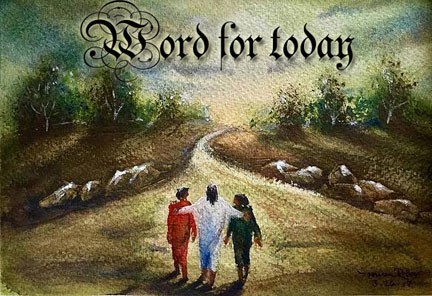Watch
Events
Articles
Market
More
You shall command the people of Israel that they bring to you pure beaten olive oil for the light, that a lamp may regularly be set up to burn.
#exodus 27:20
How can we keep the light of the Tabernacle burning today when we have no Tabernacle, no Temple, and no Menorah?
https://www.americantorah.com/....2020/02/25/the-oil-t



Many believers have the ability to write beautiful songs and music, (as on this media page), to honour Elohiym – BUT not all of us has that talent – like myself. So, I really invite you all who do not write music, to pen down your prayers or poems. Make yourself a journal. Honour Elohiym through your pen.
BIBLICAL POETRY
Poetic language used in Scripture is actually biblical poetry.
IN THE OLD TESTAMENT
The Old Testament contains all the poetry of Yisrael we have, and what we have was among the most important parts of their literature. It was probably well known throughout the ancient Near East, for its fame had spread even to Babylon (Psalm 137:3). Much of the Old Testament is poetic in spirit and structure, including the prophets as well as the poetic literature. The prophets have many passages of elevated poetry, studded with brilliant gems of imagery. The movement is rhythmical, using meter, parallelism, and strophic arrangement, just as in the Old Testament poetry books. The English Revised Version of the Bible (1881) did a great service to English readers by printing Old Testament poetry in parallel lines. When this is not done with the prophetic books, it is harder to see the poetic quality of these books. Note that besides the Old Testament books recognized as poetry-the Psalms, Job, Lamentations, Song of Songs, and Proverbs -- Ecclesiastes and the Prophets consist of prose and poetry. The historical books also contain fine examples of poetry. The Hebrew language was a good language for poetry. It is simple, which makes it good for communicating intense feeling and powerful pictures. It allowed great play of imagination. Figures (a person or thing standing for other things, such as the servant of Elohiym mentioned in Isaiah), metaphors (one thing being described as being something else), and hyperboles (beautiful exaggerations) are extremely common in Hebrew. Finest of all is the powerful imagery of Hebrew poetry.
COUPLETS
The normal unit of Hebrew verse is the couplet of two lines that parallel each other. This is not the only grouping of lines in Hebrew poetry, however. Units of three lines (Psalms 1:1; 5:11; 45:1-2), four (1:3; 55:21; Proverbs 27:15-16), five (Psalm 6:6-7; Proverbs 24:23-25), six (Psalm 99:1-3; Proverbs 30:21-23), and even larger combinations of parallel lines occur. As far as can be determined, biblical poetry does not use meter -- the organization of word rhythms so that there are very regular rhythms in each line, such as da-da-da-da-da-da-da-da-da-da, which is a common English meter called “iambic pentameter.” Certainly, the Hebrew poets show little concern for the careful meter that marks classic Greek and Latin, as well as much of English, poetry. The only exception is found in wailing songs or laments (Jeremiah 9:18-20; Lamentations 1-4). This is called the lamentation meter, where the verse is in two parts. Rhyme also is so rare as to be almost non-existent. On the other hand, Hebrew poetry is heavily rhythmical. Its rhythm is relatively regular, meaning that it doesn’t vary that much within a poem. There are usually three or four beats in every line, but not always. The meaning of the words and their position in the line are also significant-a feature called parallelism. This distinguishing characteristic was first clearly recognized by Dr. Robert Lowth, who in 1753 developed the principle of parallelism.
PARALLELISM
Lowth described three types of parallelism. The first is synonymous parallelism, where the thought expressed in the first part of the verse is repeated in the second part, in different terms that mean about the same thing (Psalms 2:4; 19:1; 36:1-2; 103:11-12; Proverbs 3:13-18). The second is antithetic parallelism, where the thought in the first part of the verse is contrasted with its opposite in the second (Psalm 1:6; Proverbs 10:1-4, 16-18; 13:9). The third is synthetic parallelism, where the idea expressed in the first line of a verse is developed and completed in the following lines (Psalms 1:1; 3:5-6; 18:8-10; Proverbs 26:3). There are more complicated forms of parallelism, but these three are the most common.
ACROSTIC
Another characteristic of biblical poetry is the use of the letters of the Hebrew alphabet. Psalms in which verses are linked together by letters are called acrostic. Today, an acrostic is formed by taking a name and beginning each line of the short poem with the letters that make up the name. The Hebrews took only the alphabet and arranged the lines of the poem according to the succession of the letters. Each line of a psalm may begin with a different letter, as in Psalms 25. Or each of the stanzas may begin with the same letter until all 22 letters of the Hebrew alphabet have been used, as in Psalm 119. However, this psalm, which is the most famous Hebrew acrostic poem, is quite complicated in its arrangement. Not only does each stanza begin with a letter, but each of the eight lines of every stanza begins with the same letter, so that eight arrangements move through the psalm in parallel lines. Other elaborate acrostics are 9, 10, 34, 37, 111, 112, and 145. The first four chapters of Lamentations also follow an acrostic arrangement. This example of acrostic arrangement is less visible to the English reader because the names of the Hebrew letters do not mark the beginning of the stanzas. In Lamentations 3 each letter of the alphabet begins three successive lines numbered as verses. Another acrostic occurs in Proverbs 31:10-31. It is an alphabetic description of the virtuous woman.
REFRAINS
Another poetic device is the refrain. In Psalm 136 is an outstanding example of this arrangement. The refrain is “His faithful love endures forever” and is used to end every verse. The meter of Hebraic poetry is dependent on accentuation; the unit is the couplet (which contains two lines), in which the members may be of equal or varying length. Most Hebrew poetry belongs to the category of the song or lyric. The song was accompanied by music (Genesis 31:27; Exodus 15:20; 1 Chronicles 25:6; Isaiah 23:16; 30:29; Amos 6:5) and could be associated with dance (Exodus 15:20-21). Some complete poems in the Old Testament are placed in the narrative books. The first recorded poem in the Bible is a battle song (Genesis 4:23-24). Other famous examples of this type are the Song of Moses (Exodus 15:1-18) and the Song of Deborah (Judges 5:1-31). Then there is the Taunt Song (Numbers 21:27-30), the Song of the Well (21:17-18), and songs of blessing. Of this latter type, well-known examples are the Blessing of Jacob (Genesis 49:1-27), the Blessing of Moses (Deuteronomy 33:2-29), and the four Blessings of Balaam (Numbers 23:7-10; 23:18-24; 24:3-9; 24:15-24). There are also laments for the dead (2 Samuel 1:19-27) and preaching poems that warn against improvidence (Proverbs 6:6-11) and drunkenness (23:29-35). Common throughout all of these various types of poems is religious emotion and fervour. The songs of Moses and Deborah praise YHVH as the giver of victory. Most religious Hebrew poems were probably used in worship at the sanctuary. The psalms are religious poems sung with musical accompaniment. Many are private prayers, while others were composed for public worship, especially hymns of thanksgiving sung at the tabernacle or temple. It is in the book of Psalms that the soaring spirit of Hebrew poetry rises to a level never achieved by Yisrael’s pagan neighbours; the Hebrews worshiped YHVH in spirit and in truth, and as they did so, they expressed a personal experience of the living YHVH in their soul. Hebrew poetry is in part influenced by the age, social conditions, and environment in which the writers lived. Although the Old Testament is inspired by YHVH, it can also be enjoyed as literature and should be appreciated as such. Though Ruach HaKodesh inspired the message of the Hebrew writers, they have their own, personal writing styles. Using simple and vivid words, figures of speech, and literary devices, each poet expressed a wealth of religious thought, experience, and emotion; simile (saying one thing is like something else), metaphor (saying one thing is something else), allegory (in which one thing stands in for another), hyperbole, personification (in which a nonhuman thing is represented as a human person), irony (in which two contradictory meanings can be “read into” the same words), and wordplay all enhanced each writer’s way of thinking. Hebrew poetry is the expression of the poet’s human spirit, and it is the literature of revelation, the Word of YHVH to humankind.
IN THE NEW TESTAMENT
The New Testament has a limited number of poetical passages. Probably the New Testament contains less poetry than the Old Testament because the early believers found the Old Testament Psalter good enough for their usage. All the writers of the New Testament were Jews, except Luke. He has given us some memorable poems: the Magnificat (Luke 1:46-55), the Benedictus (1:68-79), and the Nunc Dimittis (2:29-32). Interestingly, these poems are strongly Hebrew in form, character, and content. Matthew has given us the poetic Beatitudes (Matthew 5:3-12). These Beatitudes have the parallelism that is common in Old Testament poetry, specifically, synthetic parallelism (where the second line of each verse completes the meaning of the first line). There is also a definite rhythmic quality in 11:28-30. The beginning of the Gospel of John (John 1:1-18) is a fine example of Greek poetry. The New Testament Epistles contain a number of poetic passages, especially in the doxologies (the “praise-YHVH passages”-see, for example, Romans 16:25-27; Jude 1:24-25). Other sections are definitely poetry or early Christian hymns. These include Philippians 2:6-11 (“The Humility of Moshiach” hymn/ poem); Colossians 1:15-20 (“The Pre-eminence of Moshiach” hymn/poem); and 1 Timothy 3:16 (“The Incarnation” hymn/poem). The writer of Hebrews also produced a noteworthy poetic prologue (Hebrews 1:1-3). Other sections of Paul’s writings display poetic language, where rhythm and careful diction are used (see, for example, 1 Corinthians 13:1; 15:54-57). The book of Revelation also contains a number of poems of praise as well as hymns (see Revelation 5:9-10, 12-13; 7:12; 11:17-18; 15:3-4).



New Episode, Turning The Tables. Listen where you get your favorite podcasts, use the player on our homepage or here https://www.spreaker.com/show/....give-god-90-episode- With a free account you can join the chat or leave a message, please consider liking and sharing these podcasts.




The materials and dimensions of the #tabernacle and furnishings aren't arbitrary or merely practical. Every detail contains profound meaning….if only we knew how.
The mystical meaning of the Tabernacle materials, etc, was probably common knowledge at one time. At the very least, it was better known than today. Based on how the various elements are used throughout the rest of Scripture (God likes to reuse patterns), I have some thoughts about some of them. Your mileage may vary, of course.
#tetzaveh
https://soilfromstone.blogspot.....com/2017/03/materia



030325
WORD FOR TODAY “do you take your consecration seriously? ”: Exo 28:41 With them clothe your brother Aharon and his sons. Then anoint them, inaugurate them, and consecrate them, so that they will be able to serve me in the office of cohen.
WISDOM FOR TODAY: Pro 28:9 He who turns away his ear from listening to the Torah “law”, Even his prayer is an abomination.
www.BGMCTV.org



